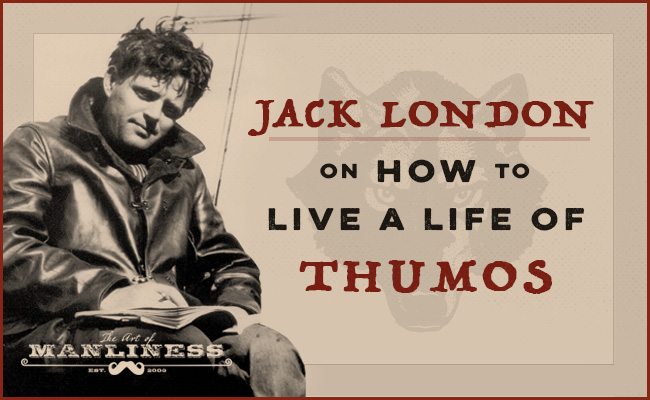
With our archives now 3,500+ articles deep, we’ve decided to republish a classic piece each Sunday to help our newer readers discover some of the best, evergreen gems from the past. This article was originally published in December 2017.
The philosopher Plato thought that the soul of man could be compared to a chariot and consisted of three parts: a dark horse which represented the appetites, a white horse that represented thumos, and the charioteer which symbolized reason, and worked to keep the two disparate steeds in balance.
Of the three parts of the soul, thumos is the hardest for us moderns to grasp. The ancient Greeks thought it essential to andreia, or manliness, but there’s no one word in contemporary language that is a real match for it. Even for the Greeks, it was a multi-faceted force that they saw as the “seat of life.” Thumos was the source of emotion — particularly a righteous anger that manifested itself not only towards one’s enemies, but also at oneself for failing to live up to one’s own principles and code of honor. Thumos was the juice to action and the energy of drive — particularly that which led a man to fight, preserve his honor, become the best of the best, and leave a legacy. It was also the location of a man’s philosophical code — a matrix of discernment through which he pondered possibilities and intuited decisions. Thumos was a man’s spiritedness, his fire in the belly.
Though thumos is a little difficult to understand in the abstract, it’s easy to recognize when embodied, and no one in modern times embodied it more than Jack London.
Known to his friends as “the wolf,” London would always remind them that “we are dying, cell by cell, every minute of our lives.” He was thus determined to make the most of every day he was given. London took pride in “the captaincy of his own powers,” and subscribed to the maxim that “Satisfaction with existing things is damnation.” He referred to the journey of life as his “adventure path,” and he was ever in pursuit of “the tang of living.”
Thus as a young man, London worked in a cannery, electrical plant, and laundry facility, taught himself to sail, became an oyster pirate, traveled the Pacific aboard a seal-hunting schooner, and ventured into the Klondike in search of gold. By age 22, he had seen and done more than 99% of men will in their entire lifetime.
London also read voraciously, immersed himself in a thorough autodidactic education, taught himself how to write, and became a bestselling author — writing classics like The Call of the Wild and White Fang, alongside 20 other books, 200 short stories, and 400 non-fiction pieces.
London joyed in both the physicality of his body and the sharpness of his mind; as The San Francisco Examiner put it, he had “a prizefighter’s jaw and philosopher’s forehead” — the “instincts of a caveman and aspirations of a poet.” His wife called him an “extraordinary entity both as Doer and Thinker.”
London never stopped seeking “the primordial vigor of life.” And given that his credo declared that he’d “rather be ashes than dust,” he unsurprisingly burned out like a flaming comet and died an early death. Yet while he never got sufficient hold of his “dark horse” and flogged the white one too hard, the unadulterated intensity of his thumos can be a great inspiration to modern men, who are often stuck in a deep malaise and access their own thumos far, far too little.
We’ve previously offered a series that details the way London’s life embodied the force of thumos, and I really recommend giving it a read. Today, we let London describe his forceful spiritedness in his own words. Below you’ll find a collection of Jack London’s quotes that each touch on a different aspect of thumos. Read a few when you’re feeling restless and sick of drifting through life; they’ll give you a kick in the pants, and a fire in the belly.
Zeal for Living
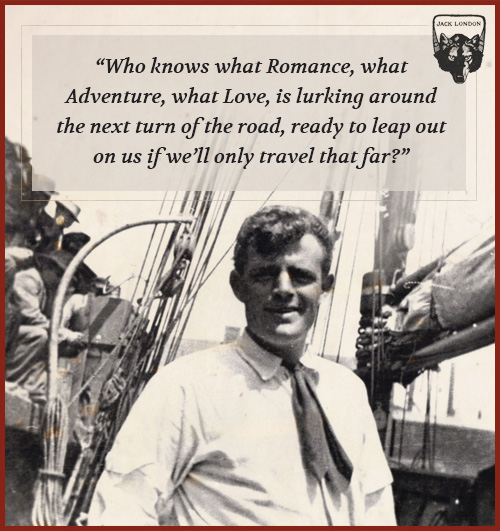
“And who knows what Romance, what Adventure, what Love, is lurking around the next turn of the road, ready to leap out on us if we’ll only travel that far?” –Inscription in George Sterling’s copy of The Road, March 26, 1914
“Have you lived? What have you got to show for it? Stocks and bonds, and houses and servants–pouf! Heart and arteries and a steady hand–is that all? Have you lived merely to live? Were you afraid to die? I’d rather sing one wild song and burst my heart with it, than live a thousand years watching my digestion and being afraid of the wet.” –Turtles of Tasman, Chapter V
“I am aware that within this disintegrating body which has been dying since I was born I carry a skeleton; that under the rind of flesh which is called my face is a bony, noseless death’s head. All of which does not shudder me. To be afraid is to be healthy. Fear of death makes for life.” —John Barleycorn, Chapter XXXVI
“Life, in a sense, is living and surviving. And all that makes for living and surviving is good.” —The Kenpton-Wace Letters, Chapter XXV
“The only way to know life is by not ignoring life.” –Letter to Joan London, August 25, 1915
“adventure is beyond price.” –“Pictures,” The Road
“Why not start at once? We’d never be younger, any of us.” –Foreword to The Cruise of the Snark
“Mankind is my passion, and the search after potentiality and the realization thereof, my hobby.” –Letter to Anna Strunsky, December 27, 1899
“After all, there’s nothing like life; and I, for one, have always stood, and shall always stand, for the exalting of the life that is in me over Art, or any other extraneous things.” –Letter to Cloudesley Johns, September 4, 1905
“It’s sometimes a dreary thing to sit and watch the game played in the small and petty way. One who not only takes a hand in the game, but calmly sits outside as well and watches, usually sees the small and petty way, and is content to face immediate losses, knowing that the ultimate gain is his. It is so small, so pitifully small, that at worst it can produce only a passing glow of anger, and after that, pity only remains, and remains, and tolerance without confidence. — Oh, why can’t the men and women of this world learn that playing the game in the small way is the losing way? They are always doomed to failure when they play against the one who plays in the large way.” –Letter to Charmian Kittredge, 1904
“I look back on my life and draw one great generalization: IT WAS MY REFUSAL TO TAKE CAUTIOUS ADVICE THAT MADE ME.” –Letter to George P. Brett, March 7, 1907
“Life achieves its summit when it does to the uttermost that which it was equipped to do.” –White Fang, Chapter IV
“I can only say that if my stories are fierce, then life is fierce. I think life is strong, not fierce, and I try to make my stories as strong as life is strong.” –Letter to Bessie Weiner, November 17, 1915
“I assure you, in reply to your question, that after having come through all of the game of life, and of youth, at my present mature age of thirty-nine years I am firmly and solemnly convinced that the game is worth the candle. I have had a very fortunate life, I have been luckier than many hundreds of millions of men in my generation have been lucky, and while I have suffered much, I have lived much, seen much, and felt much that has been denied to the average man. Yes, indeed, the game is worth the candle.” –Letter to Ethelda Hesser, September 21, 1915
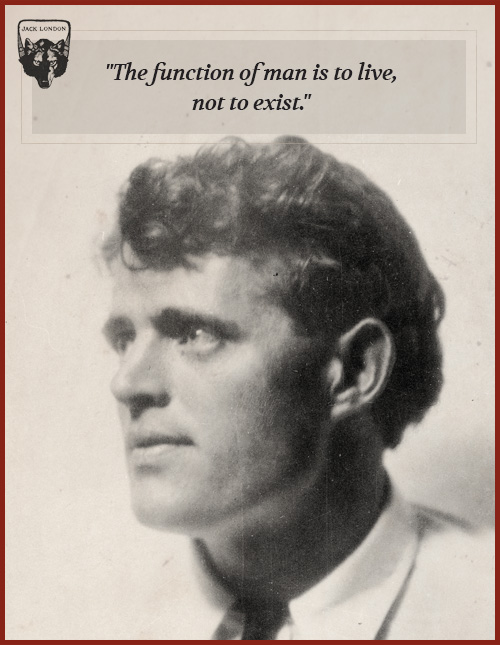
“I would rather be ashes than dust!
I would rather that my spark should burn out
in a brilliant blaze than it should be stifled by dry-rot.
I would rather be a superb meteor, every atom
of me in magnificent glow, than a sleepy and permanent planet.
The function of man is to live, not to exist.
I shall not waste my days trying to prolong them.
I shall use my time.”
–Jack London’s Credo, The Bulletin, San Francisco, California, December 2, 1916 (buy a poster of the credo here)
Fight, Courage, and Indomitability
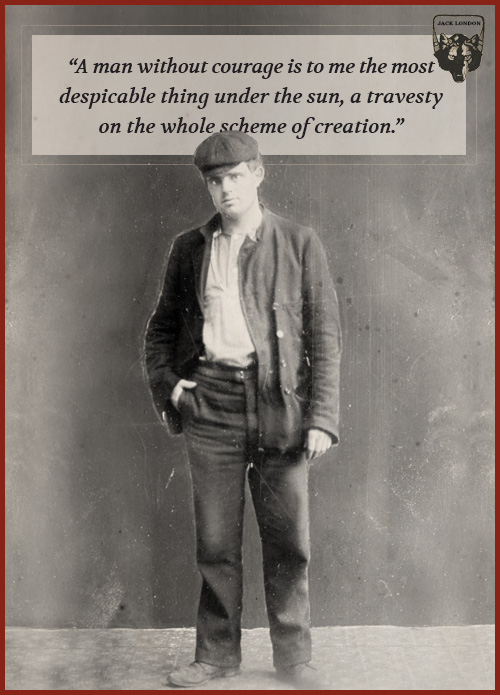
“A man without courage is to me the most despicable thing under the sun, a travesty on the whole scheme of creation.” –Letter to Cloudesley Johns, April 30, 1899
“As for cowardice in man: I can forgive the errors of a generation of women far more easily than one poltroon of the opposite gender.” –Letter to Cloudesley Johns, April 22, 1899
“We can’t get away from it. It is the fact, the irrefragable fact. We like fighting. It is our nature.
We are realities in a real world, and we must accept the reality of our nature and all its thrillableness if we are to live in accord with the real world, and those who try to get away from these realities, who by ukase of the will deny their existence, succeed only in living in a world of illusion and misunderstanding.” —“Pugilism is an Instinctive Passion of Our Race,” Dallas Times Herald, July 17, 1910
“All evolution, all change, is from without, in; not from within, out. The fundamental characteristic of all life is IRRITABILITY. In the other words, capacity for feeling pressures from without. Life itself is an equilibrium, between what is within and what is without. A change from without in the pressures, and the organism’s equilibrium is overthrown. Possessing irritability, it may be able to respond to the changed pressure and so establish a new equilibrium. If it does, it continues to live. If it fails, it dies. Life is equilibrium. If all forces which impinged upon an organism were constant, you would have a constant organism. There would be no change. There would be no development.” –Letter to Cloudesley Johns, December 22, 1900
“My rule of conduct is for every man to stand on his own legs.” –Letter to Caroline Sterling, September 15, 1905
“I would rather be heavy weight champion of the world — which I never can be — than King of England, or President of the United States, or Kaiser of Germany.” –Article in Medford Sun, August 19, 1911
“He was a killer, a thing that preyed, living on the things that lived, unaided, alone, by virtue of his own strength and prowess, surviving triumphantly in a hostile environment where only the strong survive.” —The Call of the Wild, Chapter VII
“I don’t care if the whole present, all I possess, were swept away from me – I will build a new present; If I am left naked and hungry tomorrow – before I give in I will go on naked and hungry.” –Letter to Cloudesley Johns, April 22, 1899
“Fear urged him to go back, but growth drove him on.” –White Fang, Chapter IV
Ambition and Drive
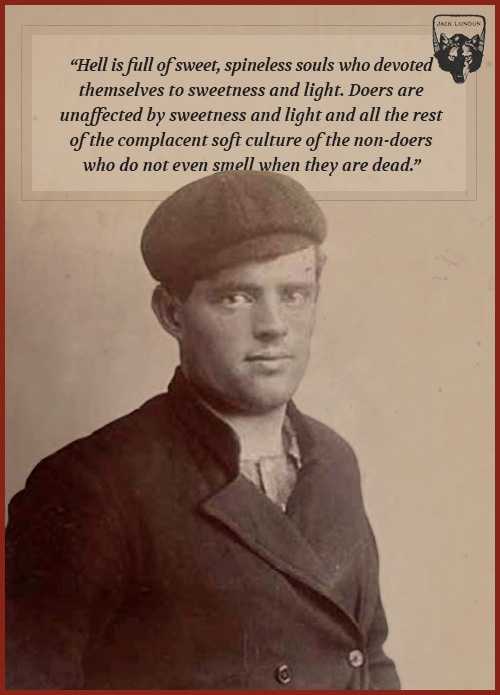
“Hell is full of sweet, spineless souls who devoted themselves to sweetness and light. . . . doers are unaffected by sweetness and light and all the rest of the complacent soft culture of the non-doers who do not even smell when they are dead.” –Letter to Philo M. Buck, Jr., July 19, 1913
“You want some short cut that, to save my soul, I have no knowledge exists. If I could short-cut men to such success, I’d quit writing for a living and go out and make millions at teaching it. I’d put all the universities out of business if I only had such a magic formula for short cutting. No, I’ll be darned if I can advise you.” –Letter to Paul Unger, January 26, 1915
“Spell it in capital letters, WORK. WORK all the time.” –“Getting Into Print,” The Editor, March 1903
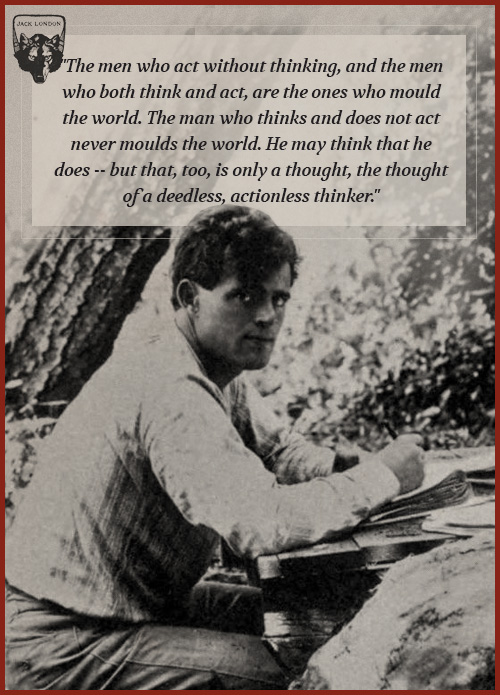
“Please remember I am talking about the world as it is. The men who act without thinking, and the men who both think and act, are the ones who mould the world. The man who thinks and does not act never moulds the world. He may think that he does — but that, too, is only a thought, the thought of a deedless, actionless thinker.” –Letter to Philo M. Buck, Jr., July 19, 1913
“I am firm. I may sometimes appear impatient at nothing at all, and all that; but this everybody who has had a chance to know me well have noticed: things come my way even though they take years; No one sways me, save in little things of the moment; I am not stubborn but I swing to my purpose as steadily as the needle to the pole; delay, evade, oppose, secretly or openly, it’s all immaterial, the thing comes my way.” –Letter to Cloudesley Johns, August 10, 1899
“Success is just this — retaining the substance and transmuting the potential into the kinetic.” –“The Question of a Name,” The Writer, December 1900
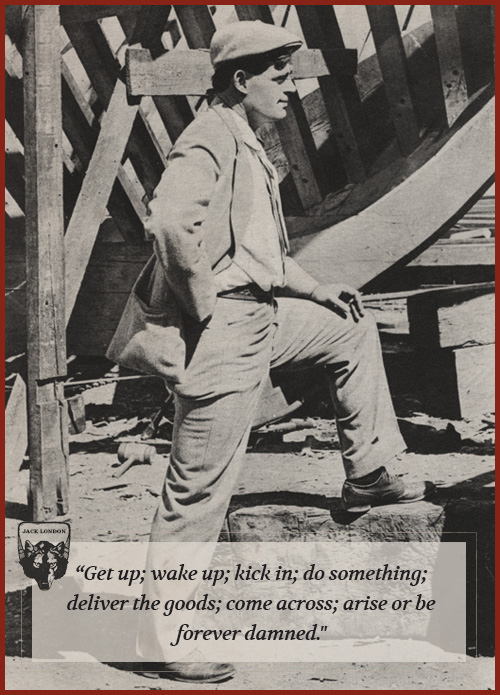
“Get up; wake up; kick in; do something; deliver the goods; come across; arise or be forever damned. Rather would I be Lucifer who told the fallen angels to arise or be forever damned, than to be one of those slack-souled angels who prefer to roast on the coals and not arise. Anybody can roast and roast; but to get up and fight requires a man.” –Letter to Philo M. Buck, Jr., March 1, 1913
“I am a believer in regular work, and never wait for an inspiration. Temperamentally, I am not only careless and irregular, but melancholy; still I have fought both down. The discipline I had as a sailor had a full effect on me. Perhaps my old sea days are also responsible for the regularity and limitations of my life. Five and a half hours [of sleep] is the precise average I allow myself, and no circumstance has yet arisen in my life that can keep me awake when the time comes to ‘turn in.’” —Jack London, by Himself
“Do know what I am doing this afternoon instead of walking down to the Library to see you? I am writing over 30 letters that have piled up on me. (I go to nobody’s house. I do no social stunts; I have this mail declined several invitations to dinner, where I was to meet Lincoln Steffens, Riis, George Kennan & others) — in short, I am a miserable stay-at-home. And because I am, I have just finished another book, (my 20th book).” –Letter to Frederick I. Bamford, February 7, 1907
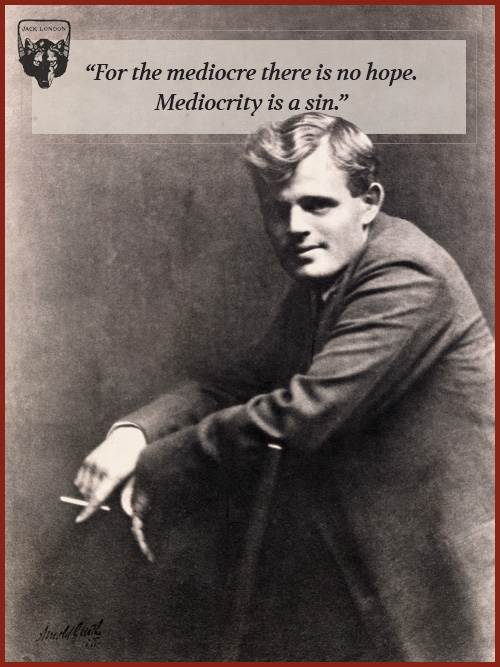
“For the mediocre there is no hope. Mediocrity is a sin.” –“The Tramp,” War of the Classes
“Are you aware of the paradox entailed by progress? It makes me both jubilant and sad. You cannot help feeling sad when looking over back work and realizing its weak places, its errors, its inanities; and again, you cannot but rejoice at having so improved that you are aware of it, and feel capable of better things.” –Letter to Mabel Applegarth, Christmas Morning, 1898
“Don’t loaf and invite inspiration; light out after it with a club, and if you don’t get it you will nonetheless get something that looks remarkably like it.” –“Getting Into Print,” The Editor, March 1903
“I am trying to master this soil and the crops and animals that spring from it, as I strove to master the sea, and men and women, and the books, and all the face of life that I could stamp with my ‘will to do.’” –Letter to Hartwell S. Shippey, February 7, 1913
“A strong will can accomplish anything . . . There is no such thing as inspiration, and very little of genius. Dig, blooming under opportunity, results in what appears to be the former, and certainly makes possible the development of what original modicum of the latter which one may possess. Dig is a wonderful thing, and will move more mountains than faith ever dreamed of. In fact, dig should be the legitimate father of all self-faith.” –Letter to Cloudesley Johns, March 30, 1899
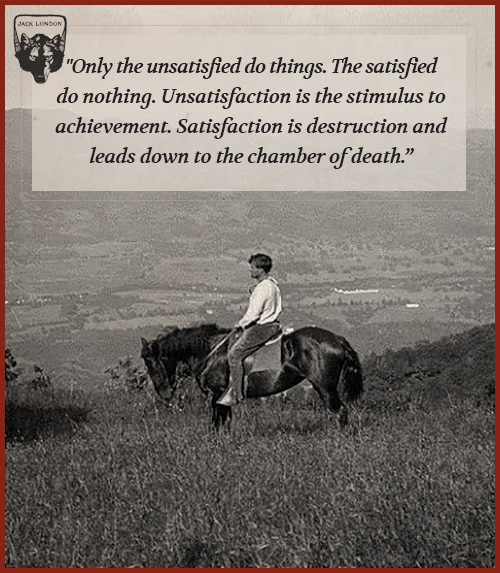
“This is discontent, but it is not the discontent of pessimism. It is noble discontent which is the secret of progress. Only the pusillanimous are content. Heart’s desires are divine discontents. Only the unsatisfied do things. The satisfied do nothing. Unsatisfaction is the stimulus to achievement. Satisfaction is destruction and leads down to the chamber of death.” –Review of “Lincoln and Other Poems,” San Francisco Sunday Examiner Magazine, November 10, 1901
“Life is very short. . . . One should have no time to dally.” –Letter to Anna Strunsky, December 21, 1899
“No; God does not punish confidence; but he grinds between the upper and the nether millstone all those of little faith and little heart, and he grinds them very fine. Of course, you will succeed — if you will work — and certainly you seem to suffer from a superabundance of energy. Apply this energy, rightly and steadily, and the world will open its arms to you.” –Letter to Anna Strunsky, May 2, 1900
“‘But the task is stupendous,’ you protest ‘I have no time.’ Others have not been deterred by its immensity. The years of your life are at your own disposal. Certainly you cannot expect to master it all, but in the proportion you do master it, just so will your efficiency increase, just so will you command the attention of your fellows. Time! When you speak of its lack you mean lack of economy in its use.” –“The Writer’s Philosophy of Life,” The Editor, October 1899
Philosophy of Life
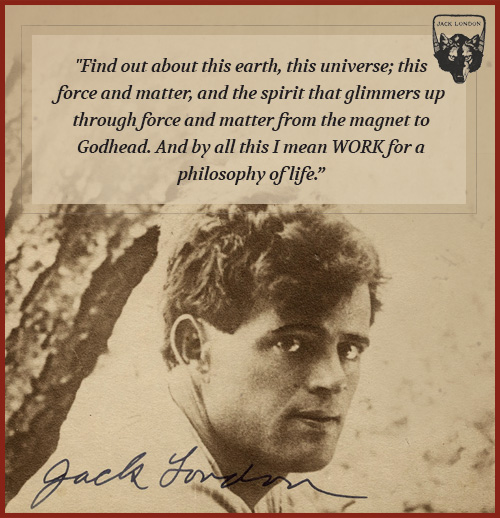
“Find out about this earth, this universe; this force and matter, and the spirit that glimmers up through force and matter from the magnet to Godhead. And by all this I mean WORK for a philosophy of life.” –“Getting Into Print,” The Editor, March 1903
“To be well fitted for the tragedy of existence . . . one must have a working philosophy, a synthesis of things.” –Letter to Cloudesley Johns, March 15, 1900
“The only way of gaining [a life] philosophy is by seeking it, by drawing the materials which go to compose it from the knowledge and culture of the world. What do you know of the world beneath its bubbling surface? . . . you must study. You must come to read the face of life with understanding. . . . You must have your hand on the inner pulse of things. And the sum of all this will give you your working philosophy, by which, in turn, you will measure, weigh, and balance, and interpret to the world. It is this stamp of personality, of individual view, which is known as individuality.” –“The Writer’s Philosophy of Life,” The Editor, October 1899
“The three great things of life are: GOOD HEALTH; WORK; and a PHILOSOPHY OF LIFE. I may add, nay, must add, a fourth — SINCERITY. Without this, the other three are without avail; and with it you may cleave to greatness and sit among giants.” –“Getting Into Print,” The Editor, March 1903
“The ultimate word is I Like. It lies beneath philosophy, and is twined about the heart of life. When philosophy has maundered ponderously for a month, telling the individual what he must do, the individual says, in an instant, ‘I Like,’ and does something else, and philosophy goes glimmering. It is I Like that makes the drunkard drink and the martyr wear a hair shirt; that makes one man a reveller and another man an anchorite; that makes one man pursue fame, another gold, another love, and another God. Philosophy is very often a man’s way of explaining his own I LIKE.” –Foreword to The Cruise of the Snark
Sense of Personal Conviction and Honor
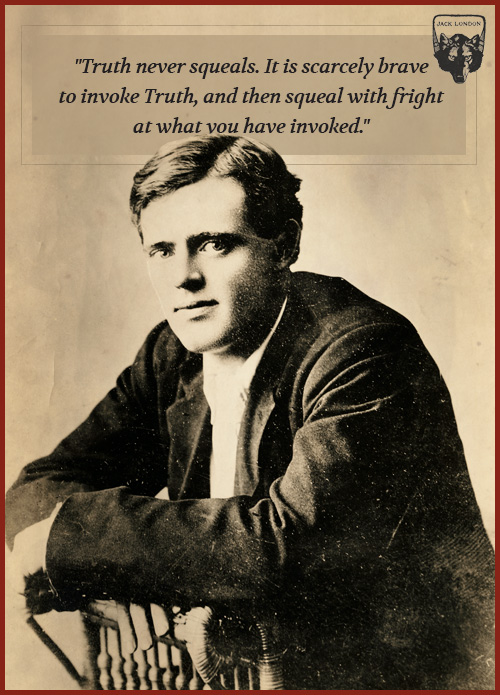
“Truth is no respecter of age, nor of youth . . . Remember, anything less that the utter truth is a lie and a cheat by you to yourself.
. . . you cannot play tricks with Truth. Any trick with Truth is a lie and a cheat. Truth says, if you are to deal fairly with her, that you must in your dealings be as pure as the high heavens, as honest as the bite of frost, as straight as the edge of the sharpest-bladed sword.
. . . let me tell you that Truth never squeals . . . It is scarcely brave to invoke Truth, and then squeal with fright at what you have invoked.
. . . it is so remarkably easy just to tell the truth in this world that I often marvel that there are so many persons who are so madly foolish, so wretchedly stupid, that they hide the truth. Truth is not merely the best policy. It is the only policy.” –Letter to Joan London, September 5, 1913
“I do not live for what the world thinks of me, but for what I think of myself.” –Letter to Charles Warren Stoddard, August 21, 1903
“Somehow I am like a fish out of water. I take to conventionality uneasily, rebelliously. I am used to saying what I think, neither more nor less. Soft equivocation is no part of me.” –Letter to Anna Strunsky, December 27, 1899
“A final word, in an effort to give you a clew to my character: What acts I have performed in this world have been directly in line with my highest conceptions of right conduct.” –Letter to Minnie Maddern Fiske, August 4, 1905
“I am, as you have divined ere this, a fool truthseeker with a nerve of logic exposed and raw and screaming. Perhaps, it is my particular form of insanity. I grope in the mud of common facts. I fight like a wolf and a hyena. And I don’t mean a bit more, or less, than I say.” –Letter to Blanche Partington, March 22, 1911
“I have always been a fighter. I have never said anything nor written anything that I have failed to back up afterwards. I have never said anything nor written anything nor published anything, and then denied the saying or the writing or the publishing of it afterwards. At the end of it all, I shall go into the darkness, standing by my opinions, and fighting for my opinions.” –Letter to the Editor, Army and Navy Journal, June 22, 1914
“Remember that truth is the greatest thing in the world. If you will be great, you will be true. If you suppress the truth, if you hide truth, if you do not rise up and speak out in meeting, if you speak out in meeting without speaking the whole truth, then are you less true than truth and by that much are you less than great.” –Letter to Joan London, August 29, 1913
The Love of Pride and Prestige for Their Own Sake
“The things I like constitute my set of values. The thing I like most of all is personal achievement — not achievement for the world’s applause, but achievement for my own delight. It is the old ‘I did it! I did it! With my own hands I did it!’” —The Cruise of the Snark, Chapter I
Wildness
“It was in the Klondike that I found myself. There, nobody talks. Everybody thinks. You get your perspective. I got mine.” —Jack London, by Himself
“But especially he loved to run in the dim twilight of the summer midnights, listening to the subdued and sleepy murmurs of the forest, reading signs and sounds as a man may read a book, and seeking for the mysterious something that called — called, waking or sleeping, at all times, for him to come.” –The Call of the Wild, Chapter VII
“And yet he remained somehow different from other dogs. He knew the law even better than did the dogs that had known no other life, and he observed the law more punctiliously; but still there was about him a suggestion of lurking ferocity, as though the Wild still lingered in him and the wolf in him merely slept.” –White Fang, Chapter IV
“With the aurora borealis flaming coldly overhead, or the stars leaping in the frost dance, and the land numb and frozen under its pall of snow, this song of the huskies might have been the defiance of life, only it was pitched in minor key, with long-drawn wailings and half-sobs, and was more the pleading of life, the articulate travail of existence. It was an old song, old as the breed itself — one of the first songs of the younger world in a day when songs were sad. It was invested with the woe of unnumbered generations, this plaint by which Buck was so strangely stirred. When he moaned and sobbed, it was with the pain of living that was of old the pain of his wild fathers, and the fear and mystery of the cold and dark that was to them fear and mystery. And that he should be stirred by it marked the completeness with which he harked back through the ages of fire and roof to the raw beginnings of life in the howling ages.” —The Call of the Wild, Chapter III
“But he is not always alone. When the long winter nights come on and the wolves follow their meat in to the lower valleys, he may be seen running at the head of the pack through the pale moonlight or glimmering borealis, leaping gigantic above his fellows, his great throat a-bellow as he sings a song of the younger world, which is the song of the pack.” —The Call of the Wild, Chapter VII
“There is an ecstasy that marks the summit of life, and beyond which life cannot rise. And such is the paradox of living, this ecstasy comes when one is most alive, and it comes as a complete forgetfulness that one is alive. This ecstasy, this forgetfulness of living, comes to the artist, caught up and out of himself in a sheet of flame; it comes to the soldier, war-mad on the stricken field and refusing quarter; and it came to Buck, leading the pack, sounding the old wolf-cry, straining after the food that was alive and that fled swiftly before him through the moonlight. He was sounding the deeps of his nature, and of the parts of his nature that were deeper than he, going back into the tidal wave of being, the perfect joy of each separate muscle, joint, and sinew, in that it was everything that was not death, that it was aglow and rampant, expressing itself in movement, flying exultantly under the stars and over the face of dead matter that did not move.” —The Call of the Wild, Chapter III
The Desire to Leave a Legacy
“The world is covered with the dust of self-called and alleged sane men who left no mark upon the face of life and are utterly forgotten. Please, please remember that the big things lie in passion and in passionate expression.” –Letter to Philo M. Buck, Jr., March 1, 1913
“‘The present is enough for common souls,
Who, never looking forward, are indeed mere clay
Wherein the footprints of their age
Are petrified forever.’”
–Letter to Philo M. Buck, Jr., March 1, 1913
“That man of us is imperishable who makes his century imperishable. That man of us who seizes upon the salient facts of our life, who tells what we thought, what we were, and for what we stood — that man shall be the mouthpiece to the centuries, and so long as they listen he shall endure.” —“These Bones Shall Rise Again,” Revolution and Other Essays
__________________________
These quotes were found both in our readings of London’s works and biographies about him, and from The Wit and Wisdom of Jack London, which, for the interested, includes many more London quotes on a wide variety of subjects.
Tags: Jack London

